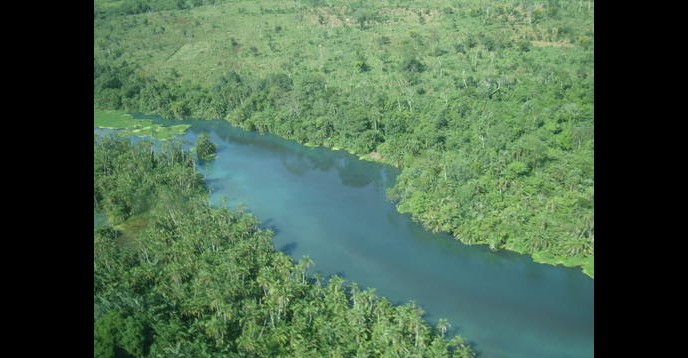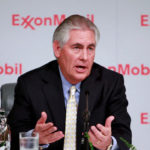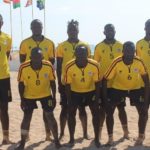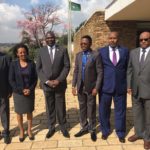The Great Lakes Advocacy Coalition for Conservation of Natural Resources (GLACCNR), an alliance of civil society organisations (CSOs) from Uganda and the Democratic Republic of Congo (DRC), has urged the governments of the two neighbouirng countries of cease all efforts to explore for oil in the eco-sensitive Greater Virunga landscape.
The 25-member coalition, which works for the sustainable use of transboundary resources in the Great Lakes Region, is making the calls following renewed efforts by the DRC government to redraw borders of two national parks, the UNESCO World Heritage Virunga and Salonga national parks, to allow for oil exploration in the parks.
“The DRC’s minister for hydrocarbons called for a meeting late last month (April 2018) with the view of discussing plans to redraw the parks’ borders to allow for oil exploration in the parks,” the environmental activists say in their May 16 communiqué to two governments.
They say Uganda’s government also remains committed to exploring for oil in Ngaji oil block covers Lake Edward, a Ramsar site, and part of Queen Elizabeth National Park, a UNESCO Humanity and Biosphere Reserve. Lake Edward,Queen Elizabeth and Virunga national parks are located in the Greater Virunga landscape.
The GLACCNR, working with host communities in the districts of Kasese, Kanungu, Hoima, Buliisa, Kibaale,Ntoroko,Rubirizi, Rukungiri and North Kivu in the DRC, has warned that failure to heed their call will result in mobilisation of communities for massive and peaceful demonstrations to resist the two governments’ plans.
The association has also called upon regional and international bodies like the United Nations Educational, Scientific and Cultural Organisation(UNESCO),United Nations Environment Programme (UNEP), the International Union for Conservation of Nature (IUCN), the World Bank and others who work to conserve nature to use their influence on the two governments to save the Greater Virunga from the pending oil threats.
“Both the governments of Uganda and the DRC need to be mindful that through treaties including the 2007 Ngurdoto-Tanzania agreement, they committed to work together to manage transboundary resources for the good of citizens of both countries. They also signed the Paris Agreement on Climate Change, the 2015 Sustainable Development Goals (SDGs) and others where they committed to avoid activities that endanger communities,” they say.Redrawing the boundaries of Virungaand Salonga national parksand conducting oil activities in Lake Edward in addition to Queen Elizabeth National Park is against the commitments of the above agreements, they say.
They say the parks and other protected areas in the Greater Virunga are of great political, economic and socio-cultural value to communities, the Great Lakes region and the international community.
Some of the other protected areas in the landscape include Bwindi Impenetrable and Rwenzori Mountains national parks (World Heritage sites), Kibaale and Semuliki national parks in addition to Lake George.
The protected areas support farming, tourism, fishing and meet the water, electricity, cultural in addition to the recreational needs of millions of Ugandan, DRC, South Sudanese, Sudanese and Egyptian citizens.
Lake Edward, they say, empties itself in the White Nile which is the headwaters of River Nile; degradation of the Greater Virunga landscape poses a threat to all the Nile riparian states including South Sudan, Sudan and Egypt.
The activists fear that should the oil exploration activities continue, food and water insecurity will occur as well as flooding caused by increasing temperatures, eroding the climate resilience of already poor and vulnerable communities. “Other negative consequences will be faced by communities while the governments enrich a few people in authority who use their positions to corruptly gain wealth at the communities’ expense,” they say.
Uganda will recall that in the last two months alone, Kasese district lost four people to floods caused by climate changes that are destroying snow on Mt. Rwenzori.
“We cannot allow our governments to endanger a critical biodiversity area like the Greater Virunga which has sustained the lives of millions of our people for generations,” the CEO of Africa Institute for Energy Governance (AFIEGO), Dickens Kamugisha, says.
“This is not the first time the DRC and Uganda governments have attempted to allow oil exploration in the Greater Virunga landscape.Since 2015, the governments have directly and indirectly continued to call on investors to explore for oil in the landscape, even when the communities and civil society are against the move.
The activists have lauded the communities and other civil societies that have continued to resist efforts to exploit oil in the Greater Virunga. “The two governments should continue to respect the views of their citizens and completely abandon any plans for oil exploitation in the area,” they say.
“We are therefore ready to mobiliseand work with host communities once again if our government does not drop the plans to redraw the two parks’ boundaries and if it fails to commit to ceasing from exploring for and exploiting oil in the Greater Virunga,” Mr Bantu Lukambo of Innovation pour le Développement et la Protection de l’Environnement (I.D.P.E), says.
GLACCNR members say the two governments should instead take advantage of regional and global energy initiatives including the Sustainable Energy For All (SE4ALL), SDG 7, the Paris Agreement on Climate Change, Power Africa and the Energy Africa among others to invest in renewable clean energy such as solar, wind and others as better energy development options that can easily meet the energy needs of all, especially the poor and vulnerable.








